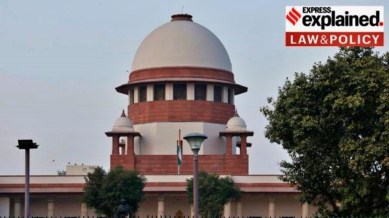What issues will the Supreme Court consider in the TN govt-Governor dispute case?
Since 2023, when the Tamil Nadu government first approached the SC about the issue, several opposition-ruled states, including Kerala, Telangana, and Punjab, have moved the apex court over such delays. The Tamil Nadu case would be a precedent for all other cases.

The Supreme Court on Friday continued to hear petitions filed by the Tamil Nadu government raising questions on the scope of the Governor’s powers in the legislative process. The state argued that the prolonged delay in acting upon Bills passed by the state legislature would result in a situation where the “system of democracy will fail in this country.”
The hearing essentially involves debating the contours of Article 200 of the Constitution, which requires the Governor to declare “that he assents to the Bill or that he withholds assent therefrom or that he reserves the Bill for the consideration of the President”. It also states that this should be done “as soon as possible after the presentation to him of the Bill for assent”.
Since 2023, when the Tamil Nadu government first approached the SC about the issue, several opposition-ruled states, including Kerala, Telangana, and Punjab, have moved the apex court over such delays. The Tamil Nadu case would be a precedent for all other cases.
Governor’s role in lawmaking
The Constitution envisages the office of the Governor as an apolitical entity. Over the years, the SC in several rulings has limited the Governor’s exercise of the powers in a permissive manner. Broadly, the Governor is bound to act on the aid and advice of a state’s Council of Ministers. However, there are a few exceptions to this. For instance, in recommending the imposition of the President’s rule under Article 356 of the Constitution, and in granting assent to Bills under Article 200.
After a Bill has been passed by a state Assembly, it is presented to the Governor for her assent. Article 200 envisages three scenarios where the Governor can:
🔴 Give assent to the Bill, in which case it becomes state law.
🔴 Withhold assent to the Bill and send it back for reconsideration by the state Assembly.
🔴 Reserve the Bill for consideration by the President of India.
If the Governor withholds assent and sends the Bill back for reconsideration, the Assembly can amend the Bill or pass it again as is. When the particular Bill is presented to the Governor again, she “shall not withhold assent therefrom”, mandating the Bill’s passage, except in cases where the Bill, in the opinion of the Governor, could “derogate from the powers of the High Court.” In that case, the Bill shall be reserved for the President’s consideration.
The Tamil Nadu dispute
Since Governor RN Ravi’s appointment in September 2021, the Tamil Nadu government, led by the Dravida Munnetra Kazhagam (DMK), has repeatedly raised concerns about the Governor withholding assent and delaying the passage of Bills passed by the state assembly. In November 2023, the state government moved the SC, claiming that Governor Ravi had been withholding assent on several Bills, the earliest of which had been pending since January 2023.
While hearing the matter on November 6, 2023, the SC said Governors “cannot be oblivious to the fact that they are not elected representatives of the people”. It also said, “Why do parties have to come to the SC? The Governors must act before it comes to the SC”.
Around two weeks later, the Tamil Nadu Assembly re-enacted the pending Bills. However, Governor Ravi referred two of these Bills to the President for her consideration, and withheld assent for the rest.
Issues that SC will consider
Some of the issues under consideration by the Court are:
🔴 If the Governor has the authority to withhold assent for a second time after a state Assembly has passed a Bill following its initial withholding, especially when the Governor did not reserve the Bill for the President when it was first presented.
🔴 If the Governor’s power to refer a Bill to the President is exercisable upon any Bill or it is limited to certain specified categories.
🔴 Considerations that influence the Governor’s decision to refer a Bill to the President instead of giving assent.
🔴 Examining the concept of pocket veto — when the Governor holds assent indefinitely — and if it has any constitutional validity in India.
🔴 If there should be a time frame for the Governor to give assent to a Bill under Article 200.
SC on time frame for assent
Although Article 200 states that the Governor must take a call on granting assent to a Bill “as soon as possible”, it does not mandate a specific timeline. The SC has addressed this issue in past decisions. However, it has not passed any directions imposing a timeline for Governors.
In Nabam Rebia and Bamang Felix vs Deputy Speaker (2016), Justice Madan Lokur, who was part of a five-judge Constitution Bench which was hearing the case, wrote a separate concurring opinion on the issue. He said, “The Governor cannot withhold assent to a Bill indefinitely but must return it to the Assembly with a message and this could include his recommendation for amendments to the Bill.”
The SC reiterated this in November 2023 while hearing a case filed by the Punjab government, which had accused Governor Banwarilal Purohit of withholding assent to four Bills. The court said the phrase “as soon as possible” in Article 200 means that “the Governor cannot be at liberty to keep the Bill pending indefinitely without any action whatsoever”.